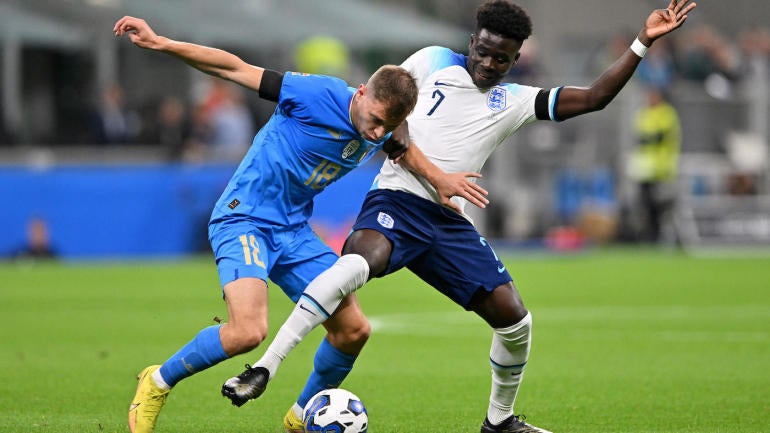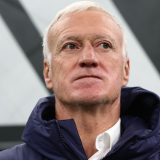
It is hard to believe that it is little more than a year since England found themselves within touching distance of a glorious prize. Kings of Europe, they might have been. Now Italy have dispatched them from the royal court, bound for a spell in the wilderness with the likes of Albania, Kazakhstan and Georgia.
Plagued with the threat of a first relegation in 150 years in English international football, Gareth Southgate dug into the playbook of his predecessors. Sam Allardyce and Roy Hodgson earned the England job in the first place because they could do what the Three Lions set out to do on this night: Keep it disciplined at the back, hit it long to the front men and try to win a set piece.
It never really looked like paying off, not unless Jude Bellingham could produce something miraculous. Three matches without scoring, an open play goal drought that now runs to seven and a half hours, the five-game run without defeat the worst for this country since 2014. Even in defeat at Wembley in Euro 2020, it seemed unimaginable that Southgate -- the most successful England manager of a generation -- might have lost the faith of his supporters. This summer's 4-0 defeat against Hungary at the Molineux ended with cries of mutiny, and it is fair to question whether there will be more against Germany on Monday.
Increasingly, you see the point of Southgate's most vocal critics. Results at the 2018 World Cup and Euro 2020 have earned him the right to do things his way, but it is fair to question whether -- 56 days before England kick off in Qatar -- he knows what the right way is anymore. Caught between his more conservative tendencies and a player pool deep in attacking prospects, his side is neither one thing nor the other. It cannot deliver the elegance that the internet demands, but it hardly looked like keeping Italy at bay as it subsided to a 1-0 loss in Milan that could have been far worse.
There is, of course, a balance to be struck. International tournaments are not, in general, rewarding to the teams who play the most front-footed football. Spain, Germany and France all won World Cups precisely by being less than the sum of their parts. But they did have a serious goalscoring threat. A sense that if you left them gaps to exploit, they would rip you to shreds -- an Italy in 2012 or Brazil in 2014 moment. Even Southgate's England had the thumping meted out on Ukraine at last summer's European Championships.
Scarcely a year on this iteration are suffocating themselves. You could not want for progressive talent in Southgate's side, the national's team player of the year Bukayo Saka was shoehorned in at left wing back to make room for Phil Foden and Raheem Sterling alongside Harry Kane. Add Bellingham, Reece James and Declan Rice into the mix and this was a team filled with players who are used to imposing their will on their opposition.
They never looked like doing so in a soporific first 45 minutes at the San Siro. The odd dart through the middle by Bellingham aside, England looked devoid of ideas for how to get the ball up to their hyper-talented front line. It does not help in that regard that Nick Pope is inferior to Jordan Pickford and Aaron Ramsdale with the ball at his feet. Harry Maguire, meanwhile, was playing like a man acutely aware that the eyes of the English public were firmly fixed on the left side of the back three, waiting for him to err.
It did not take long. Gianluca Scamacca rising above the Manchester United captain at the back post but flicking against the post from a tight angle. Maguire's greatest quality is his ability to step out into midfield and pick a pass; he seemed as fearful of the danger that could cause as any on watcher.
Meanwhile, a more attack-minded Southgate selection was shrewdly probed by Italy, who would wait for the moment Saka had pushed too far ahead and spring into the space he had left behind. Arsenal's No. 7 is not a wing back and he does not even play on the left flank at club level. In Sterling, Rice and Maguire, England had a settled ecosystem and veteran internationals who could help the 21-year-old play to a plan; it was just there was no evidence of what that was. This felt like a selection to be perceived as more progressive, but either Saka should be in the team in something approximating his strongest position or Southgate should select someone who is vaguely comfortable at left wing back.
Though the visitors opened up in the second half, that only opened seams for Italy to attack, a marginal offside flag meaning that if Nicolo Barella had turned in Federico Dimarco's cross as he ought to have it would not have counted. England were enjoying more defensive possession but still the impressive Giacomo Raspadori looked to have a sense of how to get towards goal that no one else did.
It came midway through the second half, the Napoli forward beating Kyle Walker in behind and killing Leonardo Bonucci's long ball over the top. The advantage of having three center backs is that one can push up to their opponents safe in the knowledge that they have men in reserve to cover them. And yet no one went near Raspadori, who had time to set himself and bend the ball into the far corner.
Desperation eventually brought purpose to England, Kane drawing an excellent double save from Gianluigi Donnarumma, but it gave no fewer chances to Italy, who could have rubbed yet more salt into the wound they cut open at Wembley last summer. On that day when Donnarumma, Bonucci and Giorgio Chiellini defied the Three Lions, it seemed to be nothing more than a flesh wound, a scratch that would heal over into the sort of scars that any victor has.
Fourteen months on, England are like Monty Python's "Black Knight," utterly incapable of doing damage to their foe. As they crash out of the top tier of European football, it is hard to shake the sense that the best of the best will look on Southgate's men as King Arthur did on his limbless foe, with more mirth than fear.
![[object Object] Logo](https://sportshub.cbsistatic.com/i/2020/04/22/e9ceb731-8b3f-4c60-98fe-090ab66a2997/screen-shot-2020-04-22-at-11-04-56-am.png)

















